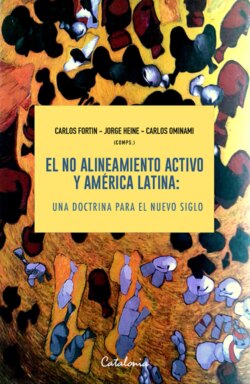Читать книгу El no alineamiento activo y América Latina - Jorge Heine - Страница 17
Referencias
ОглавлениеAcharya, A. 2018. The End of American World Order. Cambridge: Cambridge University Press.
Acharya A. y B. Buzan. 2019. The Making of Global International Relations: Origins and Evolution of IR at its Centenary.Cambridge: Cambridge University Press.
Actis E. y N. Creus. 2020. La disputa por el poder global. China contra Estados Unidos en la crisis de la pandemia. Buenos Aires: Capital Intelectual.
Albertoni N. y J. Heine. 2020. América Latina se está quedando al margen del mundo que viene. New York Times, 30 de noviembre.
Anonymous. 2021. The Longer Telegram: Toward a New American China Strategy. Washington D.C.: The Atlantic Council, en https://www.atlanticcouncil.org/wp-content/uploads/2021/01/The-Longer-Telegram-Toward-A-New-American-China-Strategy.pdf.
Bremmer, I. 2020. No, the US and China are not heading towards a new Cold War. TIME, 28 December, en https://time.com/5920725/us-china-competition/.
Briceño Ruiz J. 2019. Del saber a la teorización en el regionalismo latinoamericano. IBEROAMERICANA: Nordic Journal of Latin American Studies 48(1):120-129, en https://www.iberoamericana.se/articles/10.16993/iberoamericana.467/.
Calder K. 2019. Super Continent:The Logic of Eurasian Integration. Stanford: Stanford University Press.
CEPAL. 2021. Perspectivas del Comercio Internacional de América Latina y el Caribe 2020: la integración regional es clave para la recuperación tras la crisis. Santiago: CEPAL, enero, en https://www.cepal.org/es/publicaciones/46613-perspectivas-comercio-internacional-america-latina-caribe-2020-la-integracion.
Cooley A. y D. Nexon. 2020. Exit from Hegemony: The Unraveling of the American Global Order. Oxford: Oxford University Press.
Damodaran A. K. 1983. Jawaharlal Nehru and Non Alignment. India Quarterly 39(1): 41-49, January-March.
De la Torre, A. et al. 2015. Latin America and the Rising South: Changing World Changing Priorities. Washington D.C.: The World Bank en https://openknowledge.worldbank.org/handle/10986/21869.
Deciancio M. y D. Tussie. 2019. Globalizing Global Governance: Peripheral Thoughts from Latin America. Fudan Journal of the Humanities and Social Sciences, 15 April en https://doi.org/10.1007/s40647-019-00263-3.
Drache D., A.T. Kingsmith y D. Qi. 2019. One Road, Many Dreams: China’s Bold Plan to Remake the Global Economy. London: Bloomsbury China.
Fortin C., J. Heine y C. Ominami. 2020a. Latinoamérica: No Alineamiento y la segunda Guerra Fría. Foreign Affairs Latinoamérica 20(3): 107-115.
________. 2020b. El no alineamiento activo: un camino para América Latina. Nueva Sociedad, septiembre.
Friedman T. 2005. The World is Flat: A Brief History of the 21st Century. New York: Viking.
Gallagher K. y J. Heine. 2021. Biden needs to reverse Trump’s economic policy in Ecuador. The Hill, 26 January.
Getachew A. 2019. Worldmaking after Empire: The Rise and Fall of Self-Determination. Princeton: Princeton University Press.
González G. et al. 2021. Coyuntura crítica, transición de poder y vaciamiento latinoamericano. Nueva Sociedad 291: 49-65, enero-febrero.
Hopkin J. 2020. Anti-System Politics: The Crisis of Market Liberalism in Rich Democracies. New York: Oxford University Press.
Ikenberry G.J. 2020. A World Safe for Democracy: Liberal Internationalism and the Crises of Global Order. New Haven: Yale University Press.
Riggirozzi P. y D. Tussie, comps. 2012. The Rise of Post-Hegemonic Regionalism: The Case of Latin America. Cham Switzerland: Springer.
Roberts C., L.E. Armijo y Katada, S. N. 2017. The BRICS and Collective Financial Statecraft. New York: Oxford University Press.
Rouquié A. 1989. América Latina: Introducción al Extremo Occidente. Buenos Aires: Siglo XXI.
________. 2020. La encrucijada latinoamericana y los actores globales. En A. Serbin y W. Grabendorff (comps.), El redescubrimiento de América Latina y los actores globales. Barcelona: Icaria y CRIES.
Sanders B. 2021. Washington’s Dangerous New Consensus on China: Don’t Start Another Cold War. Foreign Affairs 17 June.
Serbin, A. 2020. Eurasia y América Latina en un mundo multipolar. Barcelona: Icaria y CRIES.
Schenoni, L. y A. Malamud. 2021. Sobre la creciente irrelevancia de América Latina. Nueva Sociedad 291:66-79, enero-febrero.
Snyder, G. 1997. Alliance Politics. Ithaca: Cornell University Press.
Stallings, B. 2020. Dependence in the 21st Century: The Political Economy of China-Latin American Relations.Cambridge: Cambridge University Press.
Stuenkel, Oliver. 2020. The BRICS and the Future of Global Order. 2nd. ed. New York: Lexington Books.
________. 2016. Post-Western World: How Emerging Powers are Remaking Global Order. Cambridge: Polity Press.
Walt, Stephen. 1995. Alliance Formation and the Balance of Power. En Brown, M.E., S.M. Lynn-Jones y S.E. Miller, comps., The Perils of Anarchy, 208-248. Cambridge: Cambridge University Press.
Wilkins, T. 2012. Alignment, not “alliance”—the shifting paradigm of international security cooperation: toward a conceptual taxonomy of alignment. Review of International Studies 38(1): 53-76.
Ye, M. 2020. The Belt Road and Beyond: State-Mobilized Globalization in China: 1998-2018. Cambridge: Cambridge University Press.
